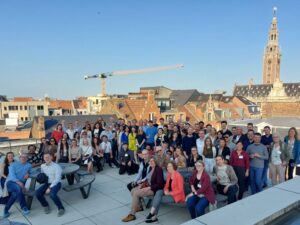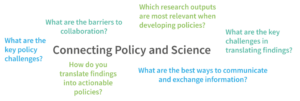Highlights from the EHEN Scientific Meeting and Policy-Research Event 2023

The event was organised by the EXIMIOUS and LongITools project coordination teams, the current EHEN leads, and hosted at KU Leuven. It featured 62 presentations on all aspects of EHEN’s research, spanning an extraordinary range of topics. Notable themes included early life exposures, health effects of air and noise pollution, and projects focusing on urban design. Research techniques presented included statistical methods, metagenomic analysis, cell profiling, biomarkers, and Artificial Intelligence. Details of each project and links to their latest publications can be found on the EHEN website.
Day two wrapped up with an exhibition featuring posters, tools and product demonstrations from all nine projects. Some of the projects’ research tools and guidelines are already publicly available on the EHEN website via its Exposome Toolbox.
Exposome Research: Understanding and Addressing Policy Challenges
On day three, EHEN’s Communication, Dissemination and Policy Working Group invited environmental and health policy specialists to an open event with EHEN researchers. With a focus on exposome research-policy exchange, we took the opportunity to remind ourselves of the importance of collaborative research and the power of addressing key challenges from different perspectives.
EHEN’s Peter Hoet, EXIMIOUS Coordinator, opened the session with an explanation of the exposome and the complex nature of the research being undertaken. Rita Araujo from the European Commission (EC) Directorate-General for Research and Innovation (DG RTD) presented the EC’s goals and expectations around exposome research, and Lorena Korosec, from the EC Directorate-General for Environment (DG ENV), presented on the European Green Deal Zero Pollution Action Plan. Sinaia Netanyahu from the World Health Organisation provided an overview of the global challenges around health policy.
The speakers outlined the policy priorities of relevance to exposome research and highlighted several areas where they believe EHEN could contribute to policy development, such as air, water and soil pollution, and transport noise. They spoke of the continuing need for high-quality evidence and modelling tools to define and predict the health impacts of environmental exposures.
From EHEN, LongITools Coordinator Sylvain Sebert highlighted areas where scientific research could inform policy making, including ethical frameworks, health economics, and urban planning.
In the workshop and discussions that followed the presentations, both policymakers and researchers spoke of the challenges of translating the findings of scientific publications into insights that could be used for policy development, citing the need to find a “common language”. Policymakers stressed that the research impact and the scope of its effect should be clearly identified and communicated. This would have a direct influence on policymakers’ decisions and facilitate securing resources and funding.

EHEN researchers also raised concerns about chemicals that are currently unregulated by existing frameworks, in particular REACH, and spoke of the need to engage with policymakers on the health risks linked to exposures within the workplace.
The event was a step forward in engaging with policymakers, at a point where results and publications from EHEN projects are gathering momentum. The key take-aways for EHEN are:
Continue to talk to one another and try to find opportunities for regular interaction and knowledge exchange.
– Respond promptly to requests for information from policymakers.
– Share the key results and messages concisely, in language understood by non-technical experts, using clear terminology and without jargon.
– Relate key messages to existing policies and initiatives and/or policy needs.
– Regularly present results collectively, where possible, to ensure a more holistic view.
Sylvain Sebert says:
As the largest cluster of EU research projects focused on the environment and health, we can ensure our individual research is not just a ‘drop in the ocean’ for policymakers. EHEN’s collective evidence can effectively inform policies and initiatives which drive change to ensure a healthy exposome becomes the norm.”
A recording of the stakeholder event is available below.
